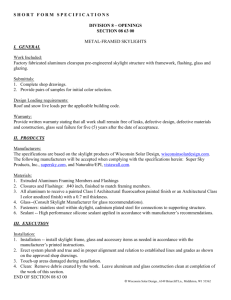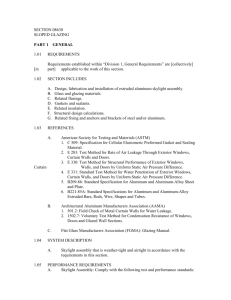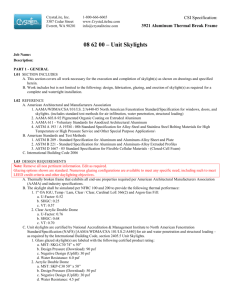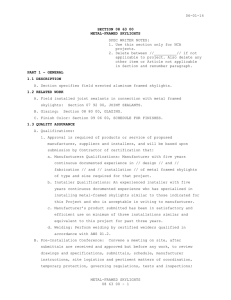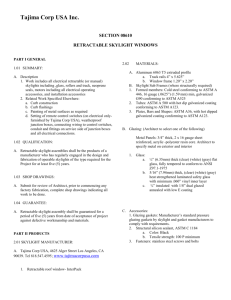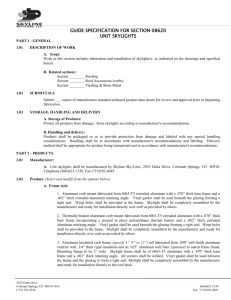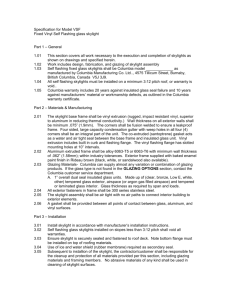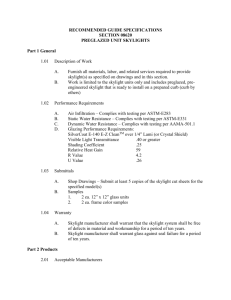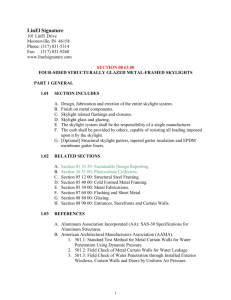05-01-15 SPEC WRITER NOTE: Delete between project. Also delete any other item
advertisement
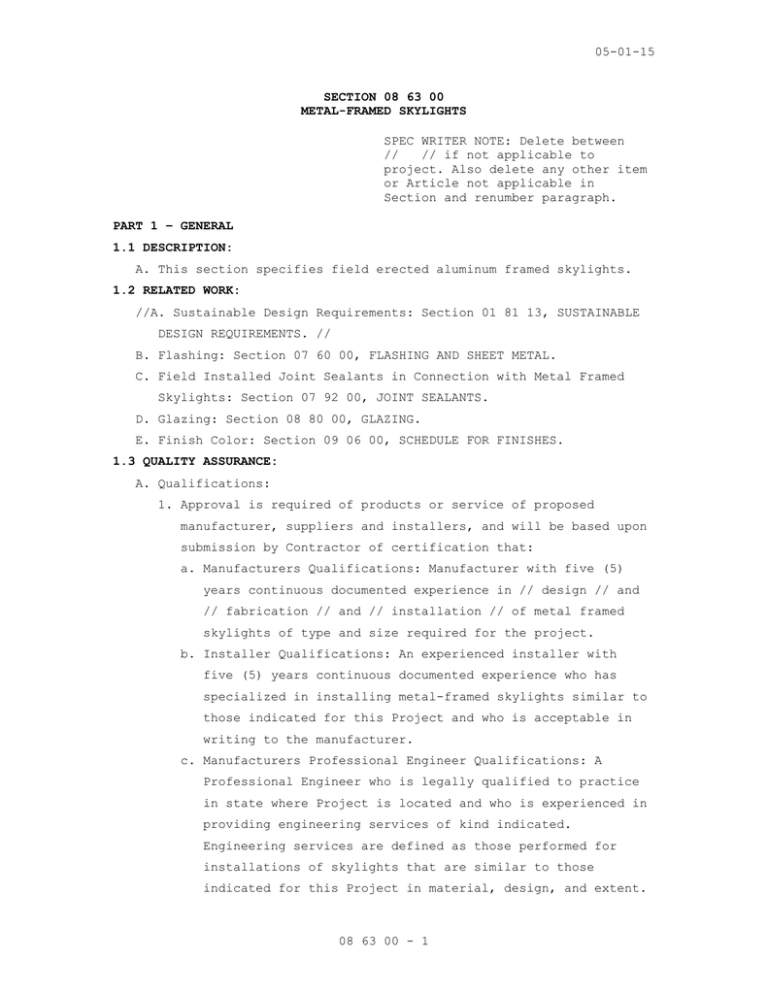
05-01-15 SECTION 08 63 00 METAL-FRAMED SKYLIGHTS SPEC WRITER NOTE: Delete between // // if not applicable to project. Also delete any other item or Article not applicable in Section and renumber paragraph. PART 1 – GENERAL 1.1 DESCRIPTION: A. This section specifies field erected aluminum framed skylights. 1.2 RELATED WORK: //A. Sustainable Design Requirements: Section 01 81 13, SUSTAINABLE DESIGN REQUIREMENTS. // B. Flashing: Section 07 60 00, FLASHING AND SHEET METAL. C. Field Installed Joint Sealants in Connection with Metal Framed Skylights: Section 07 92 00, JOINT SEALANTS. D. Glazing: Section 08 80 00, GLAZING. E. Finish Color: Section 09 06 00, SCHEDULE FOR FINISHES. 1.3 QUALITY ASSURANCE: A. Qualifications: 1. Approval is required of products or service of proposed manufacturer, suppliers and installers, and will be based upon submission by Contractor of certification that: a. Manufacturers Qualifications: Manufacturer with five (5) years continuous documented experience in // design // and // fabrication // and // installation // of metal framed skylights of type and size required for the project. b. Installer Qualifications: An experienced installer with five (5) years continuous documented experience who has specialized in installing metal-framed skylights similar to those indicated for this Project and who is acceptable in writing to the manufacturer. c. Manufacturers Professional Engineer Qualifications: A Professional Engineer who is legally qualified to practice in state where Project is located and who is experienced in providing engineering services of kind indicated. Engineering services are defined as those performed for installations of skylights that are similar to those indicated for this Project in material, design, and extent. 08 63 00 - 1 05-01-15 d. Manufacturer's product submitted has been in satisfactory and efficient use on minimum of three (3) installations similar and equivalent to this project for past three (3) years. e. Testing Agency Qualifications: ISO 9000. Refer to Performance Requirements and Field Quality Control articles for testing requirements. f. Product Options: Information on construction documents establishes requirements for aesthetic effects and performance characteristics of metal-framed skylights. Aesthetic effects are indicated by dimensions, arrangements, alignment, and profiles of components and assemblies as they relate to sightlines, one another, and adjoining construction. Performance characteristics are indicated by criteria subject to verification by one (1) or more methods including preconstruction testing, fieldtesting, or in-service performance: 1) Do not modify intended aesthetic effects. If modifications are proposed, submit comprehensive explanatory data for review. g. Welding: Welding is to be performed by certified welders qualified in accordance with AWS D1.2/D1.2M, using procedures, materials and equipment of the type required for this work. SPEC WRITER NOTE: Delete this paragraph if project size does not warrant a pre-installation conference. //F. Pre-Installation Conference: 1. Prior to starting installation of skylight system schedule conference with Contracting Officer Representative (COR) to ensure (1) a clear understanding of drawings and specifications; (2) onsite inspection and acceptance of structural and pertinent structural details relating to skylight system; and (3) coordination of work of various trades involved in providing related work. Conference is to be attended by Contractor; personnel directly responsible for installation of skylight system, flashing and sheet metal work 08 63 00 - 2 05-01-15 and skylight manufacturer. Conflicts are to be resolved and confirmed in writing. // 1.4 SUBMITTALS: A. In accordance with Section 01 33 23, SHOP DRAWINGS, PRODUCT DATA, AND SAMPLES. //B. Sustainable Design Submittals, as described below: //1. Volatile organic compounds per volume as specified in PART 2 - PRODUCTS.// // C. Installer qualifications. D. Manufacturer's Literature and Product Data: 1. Manufacturers standard details and fabrication methods. 2. Data on finishing, components, and accessories. 3. Instructions: Submit detail specifications and instructions for installation, and adjustments. 4. Recommendations for maintenance and cleaning of exterior surfaces. E. Shop Drawings: Show elevations of skylights at 1:5 (3” = 1’0”) scale, metal gages, details of construction, methods of anchorage, glazing details, and details of installation. F. Metal finish samples. G. Design Data: Submit structural and thermal calculations for metal-framed skylights. Structural calculations and design shop drawings are to be signed and sealed by a Structural Engineer registered in state in which project is to be located. H. Quality control test reports. 1.5 DELIVERY, STORAGE, AND HANDLING: A. Refer to AAMA CW 10 for care and handling of architectural aluminum from shop to site. B. Inspect materials delivered to site for damage. with minimum handling. Unload and store Provide storage space in dry location with adequate ventilation, free from dust or water, and easily accessible for inspection and handling. Stack materials on nonabsorptive strips or wood platforms. Do not cover frames with tarps, polyethylene film, or similar coverings. Protect finished surfaces during shipping and handling using manufacturer's standard method, except that no coatings or lacquers are to be applied to surfaces to which caulking and glazing compounds must adhere. 08 63 00 - 3 05-01-15 1.6 PROJECT CONDITIONS: A. Field Measurements: Where metal-framed skylights are indicated to fit to other construction, verify dimensions of other construction by field measurements before fabrication and indicate measurements on shop drawings. Coordinate fabrication schedule with construction progress to avoid delaying Work. 1.7 WARRANTY A. Comply with FAR clause 52.246-21, "Warranty of Construction". B. Manufacturer Warranty: Manufacturer shall their metal-framed skylights for a minimum of ten (10) // // years from date of installation and final acceptance by the Government. Submit manufacturer warranty. 1.8 APPLICABLE PUBLICATIONS: A. Publications listed below form a part of this specification to extent referenced. Publications are referred to in text by basic designation only. B. American Architectural Manufacturers Association (AAMA): 501-05..................Methods of Test for Exterior Walls 503-08..................Field Testing of Metal Storefronts, Curtain walls and Sloped Glazing Systems 1503-09.................Test Method for Thermal Transmittance and Condensation Resistance of Windows, Doors and Glazed Wall Sections 2605-11.................Superior Performing Organic Coatings on Architectural Aluminum Extrusions and Panels CW 10-04................Curtain Wall Manual No. 10 Care and Handling of Architectural Aluminum from Shop to Site CW 13-85................Curtain Wall Manual #13 Structural Sealant Glazing Systems C. ASTM International (ASTM): A36/A36M-12.............Carbon Structural Steel A123/A123M-13...........Zinc (Hot-Dip Galvanized) Coatings on Iron and Steel Products A153/A153M-09...........Zinc Coating (Hot-Dip) on Iron and Steel Hardware 08 63 00 - 4 05-01-15 A193/A193M-14...........Alloy-Steel and Stainless Steel Bolting Materials for High Temperature Service A307-14.................Carbon Steel Bolts and Studs, 60,000 psi Tensile Strength B209-14.................Aluminum and Aluminum Alloy Sheet and Plate B209M-14................Aluminum and Aluminum Alloy Sheet and Plate (Metric) B211-12.................Aluminum-Alloy Bar, Rod and Wire B211M-12................Aluminum-Alloy Bar, Rod and Wire (Metric) B221-14.................Aluminum and Aluminum Alloy Extruded Bars, Rods, Wire, Shapes and Tubes B221M-13................Aluminum and Aluminum Alloy Extruded Bars, Rods, Wire, Shapes and Tubes (Metric) B316/B316M-10...........Aluminum and Aluminum-Alloy Rivet and Cold-Heading Wire and Rods C864-05(R2011)..........Dense Elastomeric Compression Seal Gaskets, Setting Blocks and Spacers C920-14a................Elastomeric Joint Sealants D1003-13................Test Method for Haze and Luminous Transmittance of Transparent Plastics D1187/D1187M-97(R2011)..Asphalt-Base Emulsions for Use as Protective Coatings for Metal E283-04(R2012)..........Determining Rate of Air Leakage Through Exterior Windows, Curtain Walls, and Doors Under Specified Pressure Differences Across the Specimen E330-02(R2010)..........Structural Performance of Exterior Windows, Curtain Walls and Doors by Uniform Static Air Pressure Difference E331-00(R2009)..........Water Penetration of Exterior Windows, Curtain Walls, and Doors by Uniform Static Air Pressure Difference E1105-00(R2008).........Field Determination of Water Penetration of Installed Exterior Windows, Curtain Walls, and Doors by Uniform or Cyclic Static Air Pressure Differences 08 63 00 - 5 05-01-15 E1886-13a...............Test Method for Performance of Exterior Windows, Curtain Walls, Doors, and Impact Protective Systems Impacted by Missile(s) and Exposed to Cyclic Pressure Differentials E1996-14a...............Standard Specification for Performance of Exterior Windows, Curtain Walls, Doors, and Impact Protective Systems Impacted by Windborne Debris in Hurricanes D. American Welding Society (AWS): D1.2/D1.2M-14...........Structural Welding Code-Aluminum E. Glass Association of North America (GANA): 2010 Edition............GANA Glazing Manual 2008 Edition............GANA Sealant Manual 2009 Edition............GANA Laminated Glazing Reference Manual 1999 Edition............GANA Fully Tempered Heavy Glass Door and Entrance Systems Design Guide. F. National Association of Architectural Metal Manufacturers (NAAMM): AMP 500-06..............Metal Finishes Manual G. National Fenestration Rating Council (NFRC): 100-14..................U-factors 200-14..................Solar Heat Gain Coefficient and Visible Transmittance at Normal Incidents. H. International Organization for Standardization (ISO): 9000....................International Quality Management System Standards and Guidelines I. Environmental Protection Agency (EPA): 40 CFR 59(2014).........National Volatile Organic Compound Emission Standards for Consumer and Commercial Products PART 2 - PRODUCTS 2.1 SYSTEM DESCRIPTION: A. Design Requirements: 1. Conform with performance requirements indicated in construction documents. 2. Extruded aluminum members with a system of alternate serrations for attachment of exterior caps and glass supports. 08 63 00 - 6 05-01-15 3. Integral guttering system within skylight framing members for positive drainage of condensation. Integral weeping system to drain to exterior. 4. Flush glazed exterior joints as indicated on construction documents. 5. All structural silicone is to be factory applied. 6. Glazing Requirement: Refer to Section 08 80 00, GLAZING for glazing requirements. 2.2 PERFORMANCE REQUIREMENTS: A. Delegated Design: Engage a qualified Professional Engineer, to design metal-framed skylights. B. Structural Members: Of sizes to support design loads as indicated on structural construction documents and as outlined below. C. Deflection of framing member in a direction normal to plane of glass when subjected to a uniform load deflection test in accordance with ASTM E330, Procedure B, and the governing dead, live, snow and wind structural design loads of the project, are not to exceed 1/175 nor 25 mm (1 inch) of its clear span for clear spans less than 6096 mm (20 feet) or 1/240 of clear spans greater than 6096 mm (20 feet). D. Air Infiltration: When tested in accordance with ASTM E283, are not to exceed 0.03 L/S per sq. m (0.04 cfm per square foot) at a static-air-processing of 75 Pa (1.57 psf) and 0.36 L/s per sq. m (0.07 cfm per square foot) at a static-air-pressure of 300 Pa (6.24 psf) of fixed skylight surface. E. Water Penetration: No water is to penetrate when skylight is tested in accordance with ASTM E331 at a differential static pressure of 20 percent of inward acting design wind pressure, with a minimum of 300 Pa (6.24 psf) // //. F. Windborne-Debris-Impact-Resistance: Metal-framed skylights are to pass missile-impact and cyclic-pressure tests when tested according to ASTM E1886 and testing information in ASTM E1996 for Wind // Zone 1 // // Zone 2 // // Zone 3 // // Zone 4 //. 1. Large-Missile Test: For glazed openings located within 9.1 m (30 feet) of grade. a. Small-Missile Test: For glazed openings located more than 9.1 m (30 feet) above grade. 08 63 00 - 7 05-01-15 G. Thermal Movements: Metal-framed skylights are to allow for thermal movements from ambient and surface temperature changes of less than the following: 1. Temperature Change: 67 degrees C (120 degrees F), ambient; 100 degrees C (180 degrees F), material surfaces // //. H. Condensation Resistance: Metal-framed skylights with fixed glazing and framing areas are to have a condensation-resistance factor (CRF) of not less than // 45 // // 53 // // // when tested according to AAMA 1503. 1. Haze Factor: Greater than 90 percent when tested according to ASTM D1003. I. Thermal Performance: Provide metal-framed skylights (inclusive of frames and glass) with performance properties specified, as indicated in manufacturer's published test data, based on procedures indicated below and certified and labeled according to NFRC: 1. Thermal Transmittance (U-Factor): Fixed glazing and framing areas are to have U-factor of not more than //4.54 W/sq. m x K (0.80 Btu/sq. ft. x h x degrees F)// //3.69 W/sq. m x K (0.65 Btu/sq. ft. x h x degrees F)// // // as determined according to NFRC 100. 2. Solar Heat Gain Coefficient: Fixed glazing and framing areas are to have a solar heat gain coefficient of no greater than // 0.6 // // 0.7 // // // as determined according to NFRC 200. 2.3 MATERIALS: A. Framework: 1. Principle Supporting Members: 3 mm (0.125 inch) minimum thickness extruded aluminum, alloy 6063-T5, 6063-T6, or 6061-T6 per ASTM B221M (B221). Profiles as indicated on construction documents. 2. Snap-on Covers and Miscellaneous Non-supporting Trim: 1.5 mm (0.062 inch) minimum thickness extruded aluminum, alloy 6063-T5 per ASTM B221M (B221). 3. Principle Formed Metal Members: 3 mm (0.125 inch) minimum thickness aluminum, alloy 5052, 5005, or 6061-T6 per ASTM B209M (B209). 08 63 00 - 8 05-01-15 4. Internal Reinforcement: ASTM A36/A36M, steel shapes as required for strength and mullion size limitations, hot-dip galvanized after fabrication in accordance with ASTM A123/A123M. B. Embeds (Concrete and Masonry): Hot-dip galvanize cast-iron, malleable-iron, or steel embed inserts complying with ASTM A123/A123M or ASTM A153/A153M requirements. C. Glazing Strips: ASTM C864: 1. Glass and glazing material as specified in Section 08 80 00, GLAZING. 2. Extruded EDPM rubber designed to comply with the following specifications: a. Hardness: 55 +/-5 Durometer. b. Tensile Strength: 12410 kPa (1800 psi) minimum. c. Elongation: 500 percent minimum (of original benchmark distance). d. Color: Black 3. Heat Aging Characteristics: a. 70 hours at 100 degrees C (212 degrees F). b. Hardness Change: +5 Durometer. c. Tensile Change: -10 percent (of original benchmark distance). d. Elongation Change: -20 percent (of original benchmark distance). 4. Weather resistance at 1 part ozone per million, 500 hours at 20% elongation (of original benchmark distance): No cracks. 5. No visual checks, cracks or breaks after completion of tests. D. Setting Blocks: 1. Extruded Type II silicone rubber designed to permit adhesion and comply with the following specifications; comply with ASTM C864: a. Hardness: 80+/- Durometer b. Color: Black E. Fasteners: 1. For Exterior Cap Retainers: ASTM A193/A193M B8 300 series stainless steel screws. 08 63 00 - 9 05-01-15 2. For Framework Connections: ASTM B211M (B211) 2024-T4 aluminum, ASTM A193/A193M B8 300 series stainless steel, and ASTM B316/B316M aluminum rivets, as required by connection. 3. For Anchoring Skylight to Support Structure: ASTM A307 zinc plated steel fasteners. F. Flashings: Comply with Section 07 60 00, FLASHING AND SHEET METAL. SPEC WRITER NOTE: Determine if glass and glazing will be a part of skylight or included under Section 08 80 00, GLAZING. Coordinate glazing thickness with drawings and specifications. G. Glass: 1. Refer to requirements of Section 08 80 00, GLAZING. 2. Glass Sizes and Clearances: a. Accommodate up to // 25 mm (1 inch) // // // glazing. b. Sizes indicated are nominal. Verify actual sizes required by measuring frames. Coordinate dimensions for glass and glass holding members to comply with applicable minimum clearances as recommended by glass manufacturer. Do not nip glass to remove flares or to reduce oversized dimensions. All cutting is to occur in factory. //H. Framing Sealants: Sealants used inside the weatherproofing system are to have a VOC content of // 250 // // // g/L or less when calculated according to 40 CFR 59, (EPA Method 24).// I. Bituminous Coating: ASTM D1187/D1187M; Cold-applied asphalt mastic, compounded for 0.4 mm (15 mil) dry film thickness per coat. Provide inert-type noncorrosive compound free of asbestos fibers, sulfur components, and other deleterious impurities. 2.3 FABRICATION: A. Skylight components are to be of materials and thickness indicated in construction documents. Details indicated are representative of required design and profiles. Unless specifically indicated or specified otherwise, methods of fabrication and assembly is to be at discretion of the manufacturer. Perform fitting and assembling of components in shop to maximum extent practicable. Anchorage devices are to 08 63 00 - 10 05-01-15 permit adjustment in three (3) directions. No exposed fasteners are permitted. B. Construct skylight(s) using a continuous aluminum curb with expansion joints as required. C. Insofar as practicable, fit and assemble work in manufacturer's shop. Work that cannot be permanently assembled is to be shop-assembled, marked and disassembled before shipment to job site. D. Design rafter bars for snap-in type glazing strips. E. Attach snap-on cap retainers using stainless steel fasteners into a system of alternate serrations, at a maximum spacing of 305 mm (12 inches) on center. F. Design snap-on cap retainer fasteners to provide not more than 187 g/mm (10 pounds per linear inch) of compression on glazing strips and glass edge. G. Use snap-on type caps to conceal snap-on cap retainer fasteners. H. Where applicable, shop rivet or weld aluminum clips to framing members or field bolt at installation. I. Set glass with exterior EDPM glazing strips. J. Use silicone setting blocks to support glass and to provide edge clearances and glass bites as outlined below, in accordance with GANA recommendations: 1. Set blocks not less than 152 mm (6 inches) from edge of glass for support of unit. 2. Glass Bite: Not less than 13 mm (1/2 inch) nor more than 16 mm (5/8 inch) on any side of glass unit. 3. Maintain 6 mm (1/4 inch) edge clearance between glass and adjacent metal framework. 4. Use rubber spacers to maintain separation of glass and adjacent metal framework. K. Locate weep holes in curb to positively drain condensation to exterior of skylight at each rafter connection. L. Dissimilar Metals: Separate dissimilar metals with bituminous coating or other separator that will prevent galvanic action. M. Fasteners: Conceal fasteners wherever possible. Countersink heads of exposed fasteners. Exposed fasteners are to have finish to match framing member into which it is installed. 08 63 00 - 11 05-01-15 2.4 METAL FINISHES: A. As specified in Section 09 06 00, SCHEDULE FOR FINISHES. //B. In accordance with NAAMM AMP 500-505 series. // //C. Anodized Aluminum: // //1. AA-M12C22A41 - Chemically etched medium matte, with clear anodic coating, Class 1 Architectural, 0.17 mm (0.7-mil) thick. // //2. AA-M12C22A42/A44 - Chemically etched medium matte with electrolytically deposited metallic compound, integrally colored coating Class 1 Architectural, 0.17 mm (0.7-mil) thick finish. Dyes will not be accepted: // a. // Light // // Medium // // Dark // bronze.// //D. High-Performance Organic Finish AAMA 2605: Two-coat fluoropolymer finish containing not less than 50 percent PVDF resin by weight in color coat. 1. Color as indicated in Section 09 06 00, SCHEDULE FOR FINISHES.// //D. High-Performance Organic Finish AAMA 2605: // Three // Four // -coat fluoropolymer finish containing not less than 50 percent PVDF resin by weight in both color and clear coat. 1. Color as indicated in Section 09 06 00, SCHEDULE FOR FINISHES.// E. Sealants: 1. Structural Flush Glazed Joints: High performance silicone sealant applied in accordance with manufacturer's recommendations. 2. Non-structural Flush Glazed Joints and Weather Seal Joints: Silicone sealants applied in accordance with manufacturer's recommendations. //3. Structural silicone sealant performance requirements: ASTM C920. a. Hardness: Type A, 30 Durometer. b. Ultimate Tensile Strength: 1172.11 kPa (170 psi). c. Tensile at 150 percent Elongation: 55.1580 kPa (80 psi). d. Joint Movement Capability after 14-Day Cure: +/- 50 percent. e. Peel Strength Aluminum, after 21 Day Cure: 599 grams per mm (32 pounds per inch). // 08 63 00 - 12 05-01-15 //4. Structural silicone is not to be used to support dead weight of vertical glass or panels. // 5. VOC content: For sealants used inside the weatherproofing system, not more than // 250 // // // g/L or less when calculating according to 40 CFR 59, Subpart D (EPA Method 24.)// PART 3 - EXECUTION 3.1 EXAMINATION: A. Prior to installation of skylight system, arrange for representative(s) of skylight manufacturer to examine structure and substrate to determine that they are properly prepared, sized and ready to receive skylight work included herein. 3.2 INSPECTION AND PREPARATION: A. Contact between aluminum and dissimilar metals is to receive a protective bituminous coating for prevention of electrolytic action and corrosion. 3.3 INSTALLATION: A. Install skylight frame, glass and accessory items as needed in accordance with manufacturer's instructions. B. Install skylight system by factory trained mechanics. C. Erect system plumb and true in proper alignment and relation to established lines and grades as shown on approved shop drawings. D. Anchor skylight to structure in strict accordance with approved shop drawings. E. Provide high-performance silicone sealants to seal horizontal joints between glass panels and silicone sealant to wet seal joints between snap-on cap retainers and glass. F. Apply sealing materials in accordance with sealant manufacturer's instructions. Before application, remove mortar dirt, dust, moisture and other foreign matter from surfaces it will contact. Mask adjoining surfaces to maintain a clean, neat appearance. Tool sealing compounds to fill joint and provide a smooth finish. 3.4 TOLERANCES: A. All parts of work, when completed, are to be within the following tolerances: 1. Maximum variation from plane or location shown on approved shop drawings: 3 mm per 3657 mm (1/8 inch per 12 feet) of length, or 10 mm (3/8 inch) in total length. 08 63 00 - 13 05-01-15 2. Maximum offset from true alignment between two members abutting end-to-end, edge-to-edge in line: .75 mm (1/32 inch). 3.5 FIELD QUALITY CONTROL: A. Testing Agency: Engage a qualified independent testing and inspecting agency to perform field quality-control tests and to prepare test reports. B. Sealant Adhesion Tests: Test installed sealant in a minimum of two (2) areas and as follows: //1. Test structural silicone sealant according to field adhesion test method described in AAMA CW 13, "Structural Sealant Glazing Systems (A Design Guide)." // 2. Test weather seal sealant as recommended in writing by sealant manufacturer. C. Water-Spray Test: Test skylights for compliance with requirements according to procedures in AAMA 501. D. Water Penetration: Test skylights for compliance with requirements according to AAMA 503, which requires testing according to ASTM E1105: Uniform Static-Air-Pressure Difference: 20 percent of positive design wind load, but not less than 300 Pa (6.24 lbf/sq. ft.). E. Repair or replace Work that does not meet requirements or that is damaged by testing; repair or replace to comply with specifications. 3.6 CLEANING: A. Install skylight frame and associated metal to avoid soiling or smudging finish. B. Clean metal surfaces promptly after installation, exercising care to avoid damage to coatings. C. Remove excess glazing and sealant compounds, dirt, and other substances. D. Follow recommendations of skylight manufacturer in selection of cleaning agents. Do not use cleaning agents containing ammonia or other compounds that might damage finished metal surfaces. E. Clean glass just prior to time of final acceptance of building, subsequent to completion of installation. 08 63 00 - 14 05-01-15 3.7 PROTECTION: A. Protect finished surfaces from damage during erection, and after completion of work. Strippable plastic coatings on colored anodized finish are not acceptable. - - - E N D - - - 08 63 00 - 15
